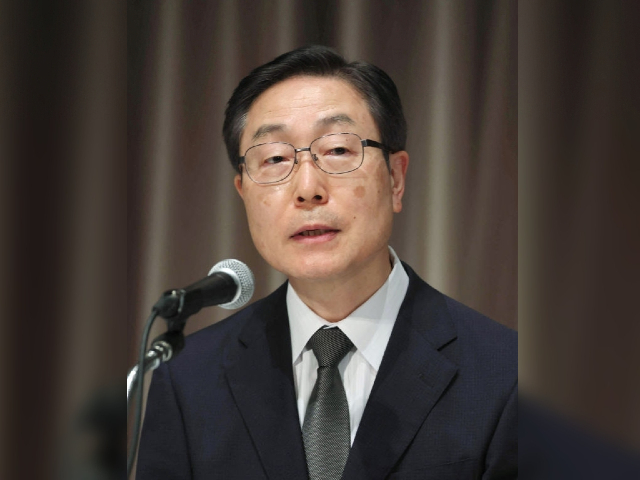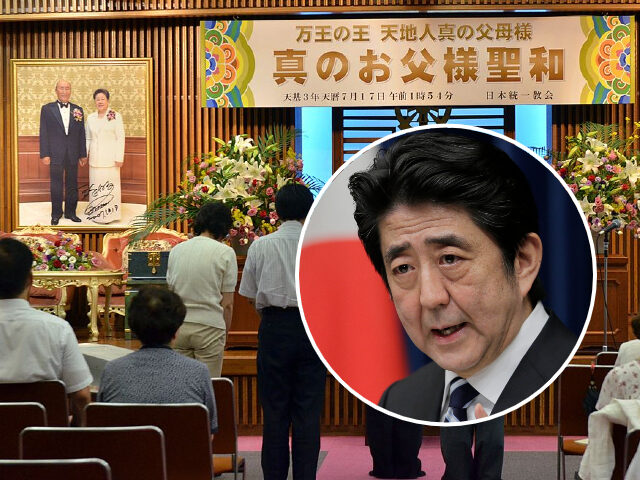Various media outlets — including the Associated Press (AP) and the Chinese Communist Party-run Global Times — alleged this week that the recently slain former Japanese Prime Minister Abe Shinzo maintained ties with a South Korean religious cult active in Japan known as the “Moonies.”
Abe’s suspected killer, Yamagami Tetsuya, reportedly confessed to fatally shooting the politician as he delivered a campaign speech in Nara, Japan on July 8. The Nara resident, 41, has also allegedly told police, who arrested him on the scene, that his motive behind the murder was tied to a grudge he held against the “Unification Church.” The organization is a South Korea-based religious cult popularly known as the “Moonies” in reference to its founder, the late Moon Sun Myung.
The AP on July 15 recalled that Abe made a video appearance at an event loosely affiliated with the Unification Church last autumn, writing:
He [Abe] appeared in events organized by church affiliates, including one in September 2021. In a video shown on a big screen at the meeting of church-related Universal Peace Federation, or UPF, Abe praised its work toward peace on the Korean Peninsula and the group’s focus on family values.
“I appreciate UPF’s focus on family values,” he said in the video. “Let’s be aware of so-called social revolutionary movements with narrow-minded values.”
Reports of his appearance in the 2021 event drew criticisms from the Japanese Communist Party and cult watchers, including a group of lawyers who have watched the Unification Church activities and supported its alleged victims.
The AP observed on Friday that “ties between the [Unifcation] church and Japan’s top leaders […] have their roots in shared anti-communism efforts during the Cold War [1947-1991].”
Tanaka Tomohiro, who leads the Japan branch of the Unification Church, told reporters at a news conference on July 11 that “Abe supported UPF’s peace movement but that he was not a member [of the Unification Church],” according to the AP.

Tomihiro Tanaka, head of the Japan branch of the Unification Church, speaks during a press conference in Tokyo on July 11, 2022. – Tanaka said the church, a global religious movement founded in Korea in the 1950s, was horrified by late former Japanese prime minister Shinzo Abe’s “barbaric” murder and would cooperate with police investigations. – Japan OUT (Photo by JIJI PRESS / AFP) / Japan OUT (Photo by STR/JIJI PRESS/AFP via Getty Images)
Tanaka “denied” that the Unification Church maintained “links to Abe” while acknowledging that the former Japanese Prime Minister “had sent a video message to its affiliated organization Universal Peace Federation [in September 2021],” Kyodo News reported on July 11.
Tanaka noted that both the Unification Church and UPF “were established by South Korean Moon Sun Myung.”
The Chinese Communist Party-run Global Times published an article on July 14 which claimed that Abe’s ties to the Unification Church expanded beyond his video appearance at the September 2021 UPF event. The newspaper alleged that Abe’s vague association with the group had “exposed an ‘open secret’ of Japanese politics — the collusion between some Japanese right-wing figures and a South Korea-originated cult.”
“Politicians and extreme religious groups in some countries have formed a backscratching relationship, from which both parties yield benefits,” the broadsheet claimed, citing the analysis of unnamed Chinese “anti-cult experts.”
“Close ties between Japan’s ruling [conservative] Liberal Democratic Party [LDP] and the religious group [Unification Church] were consolidated through political election campaigns,” an alleged Chinese cult expert told the Global Times.
“For politicians, they can win more support by colluding with such religious groups, as the cult believers can become their voters,” the unidentified analyst said.
“Also, most of the cults have their channels for preaching through which politicians can promote their political views, according to the anti-cult expert. For the cult, it can promote itself, expand its influence and further attract believers,” he added.
Tanaka confirmed on July 11 that the mother of Yamagami Tetsuya was a member of the Unification Church’s Japanese branch. Yamagami Tetsuya allegedly told Nara police that he held a grudge against the Unification Church because his mother had gone bankrupt after donating vast sums of money to the organization. Yamagami allegedly said that he intended to kill the cult’s current leader but changed his target to Abe after believing that the Unification Church head no longer visited Japan from South Korea due to Chinese coronavirus travel restrictions.
“The mother of the man who fatally shot former Prime Minister Shinzo Abe donated about 100 million yen ($720,000) to the Unification Church,” Kyodo News reported on July 15, citing Yamagami Tetsuya’s uncle.

COMMENTS
Please let us know if you're having issues with commenting.